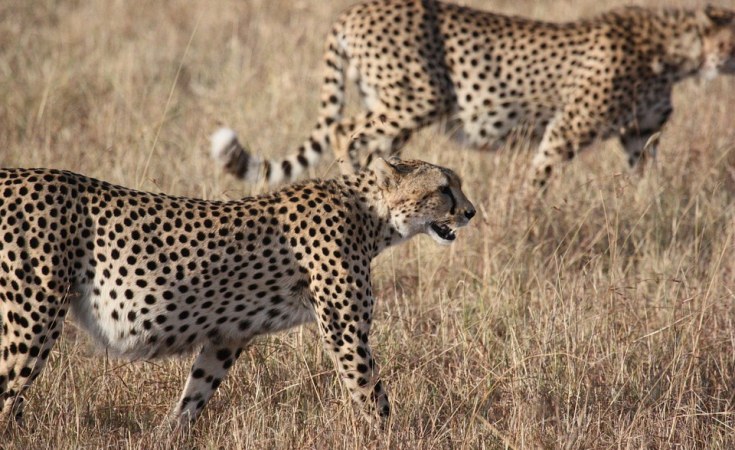The Indian government's plan to introduce African cheetahs into the wild in India after relocating them from the African continent has been criticized by many conservationists who call the idea "ecologically and scientifically flawed."
Last month, South Africa signed an agreement to send dozens of African cheetahs to India over the next decade. The first batch of 12 cheetahs, seven males and five females, is expected this month, according to the agreement.
They will be released into India's Kuno National Park (KNP) in the central Indian state of Madhya Pradesh, where eight African cheetahs are living.
"Following the import of the 12 cheetahs in February, the plan is to translocate a further 12 annually for the next eight to 10 years," said a statement issued by the Indian government the last week of January.
The first batch of eight African cheetahs was airlifted from Namibia and released in the park in September 2022, marking the beginning of the Indian government's ambitious Cheetah Introduction Project (CIP) to reintroduce the big cats to India.
Asiatic cheetahs in India became extinct over seven decades ago.
When the first group of African cheetahs arrived, S.P. Yadav, head of Project Tiger, said that the extinction of the cheetah in the country was a massive loss of biodiversity.
"It is our moral and ethical responsibility to bring back the cheetah to India," he said.
'Ecologically unsound project'
However, conservationists are divided over the Indian government's current plan to introduce African cheetahs in India.
In an opinion piece published in Nature Ecology and Evolution in October, a group of wildlife scientists from India, South Africa and other countries said that India's current Action Plan for Introduction of Cheetah in India (APICI) -- a plan prepared by CIP experts -- was "ecologically unsound, costly and may serve as a distraction rather than help global cheetah and other science-based conservation efforts."
The CIP of the Indian government estimates that a maximum of 21 cheetahs can reside in the 748-square-kilometer KNP.
Wildlife biologist Ravi Chellam, one of the authors of the opinion piece, told VOA that the KNP is too small to host a viable population of the big cats.
"Average cheetah density in the best of the habitats in Africa is 1 per 100 square kilometers. Based on an extrapolation using the density data from Africa, science informs us that seven to eight cheetahs, to a maximum of 10 cheetahs can reside within the 748-square-kilometer KNP," Chellam said.
"With an area of only 748 square kilometers, KNP is just too small to host a viable population -- estimated at about 50 adults -- of the introduced cheetahs."
Echoing Chellam's views, South Africa-based large carnivore expert Michael G.L. Mills said that the KNP is not suitable for India's cheetah action plan.
"The range quality is also important for maintaining a viable cheetah population, with a need for open or semi-open habitat, with sufficient, suitable wild prey, free from anthropogenic (made by humans) pressure and free-ranging dogs," Mills told VOA.
Mills said Kuno National Park, which is 748 square kilometers in area, is unfenced, harbors about 500 feral cattle and is surrounded by a forested landscape with 169 human settlements is not the size and quality to permit self-sustaining and genetically viable cheetah populations. Nor are other landscapes, he said.
"Adopting such a speculative and unscientific approach, as seems to be the case in this venture, will likely lead to human-cheetah conflicts, death of the introduced cheetahs or both, and will undermine other science-based species recovery efforts for the cheetah, both within India and globally," Mills added.
'Cheetahs will do very well'
However, experts involved in India's cheetah program disagree.
Yadvendradev Jhala, dean of the Wildlife Institute of India and lead scientist of the CIP, said that he "totally disagrees" with those who are critical of the APICI action plan.
"The cheetah reintroduction project is about the restoration of functional ecosystems. I am amazed to see how learned wildlife biologists could be blind or, choose to be blind, to the conservation importance of this project," Jhala told VOA, noting that the real challenge begins when cheetahs are released as free ranging.
Since they were translocated to India five months ago, all eight cheetahs are still in fenced enclosures at the KNP to help them acclimatize to their new home.
"Their survival will depend on how safe the national park and its surroundings are made from poachers and their snares," Jhala said. "As a species, the cheetah from Africa will adapt and do very well in the Indian habitat, climate and with predators and prey."
Conservationist M.K. Ranjitsinh, a member of a court-appointed committee advising the government on the cheetah introduction project, said that apart from the KNP, there are three other sites being readied where African cheetahs would be introduced.
"All the selected sites, including KNP, do have sufficient prey base, as of now, to support a certain number of cheetahs and what we hope to do is to conserve the areas so that the prey base goes up," Ranjitsinh told VOA.
"Scientists have found that these sites have the potential presently and in the future. We are prepared to take a few losses, which are bound to happen in any translocation and any reintroduction of this kind."
According to the estimate by the APICI, with the introduction of around 100 African cheetahs over the next decade, after 15 years, the KNP is expected to have an established population of 21 cheetahs.
Conservationist Chellam said, "Twenty-one cheetahs just doesn't constitute a viable population. As a result, there is no question of the introduced African cheetahs playing any other larger conservation role in India."


